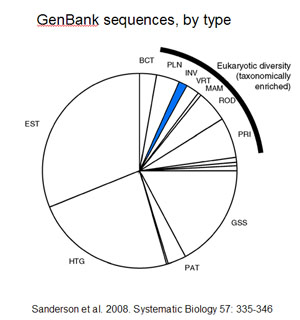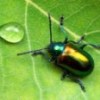
The above pie chart shows the relative proportions of described species in various groups of organisms. As we can see, most species are invertebrate animals. Things like snails, flatworms, spiders, sponges, and insects.
Now compare that slice of pie to the proportion of GenBank sequences that represent invertebrates:
 Yes, that thin blue wedge is all we've got. While most mammal species have had at least a gene or two sequenced, the vast majority of non-vertebrate species have yet to meet a pipettor.  Entire families of insects haven't received even a cursory genetic study.
Yes, that thin blue wedge is all we've got. While most mammal species have had at least a gene or two sequenced, the vast majority of non-vertebrate species have yet to meet a pipettor.  Entire families of insects haven't received even a cursory genetic study.
Of course, we make great progress with the efficiency of focusing our efforts on a small number of model organisms. But surely there's an opportunity cost of putting all our eggs in the mammal basket. What about the rest of life?

And that is why I am working on microsatellite development and sequencing for 6+ deep inverts representing 4 phyla!! We can't let the backboned man get us down!
It amazes me that people want to study evolutionary history and gene family evolution and diversification, yet do not diversify their organisms.
Perhaps insects and their allies should hire a PR firm to polish their public image. What would their slogan be,"yes we cANT"...?
As a hobbyist perspective, it is kind of neat to have a somewhat secretive hobby that no dog friends or other scum* understand. It makes it more exciting and esoteric.
* word used in the most benevolent way imaginable ;)
It goes far deeper than that, of course. How can we, as humans appreciate the natural world, or even attempt to sustain some vestige of it for our own purposes, without having an at least modest understanding of the diversity and complexity of life? Funding for all types of invertebrate research - ranging from community ecology, natural history, and morphological alpha taxonomy on to molecular biology, physiology, and even exploring the idea of 'tiny robot armies' needs to be greatly expanded if we are to have any chance of grasping the complexities of our planet. It is only through equitable distribution of our scientific efforts across the full range of the diversity of life that we will be able to provide a sound picture of the natural world to the decision makers (politicians). Otherwise, we humans will will not be around very long.